Mount Made: No Such Thing as Monkey Business
4/10/2024
Alumna Combines Passion for Animals, Research, and Policy in the Nation’s Capital
We recently had the chance to sit down with Ellen to learn more about what she’s been up to since we last spoke in 2022. Read on to refresh yourself on Ellen’s past work and learn about some new developments in her career!
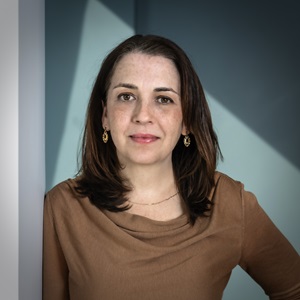
For alumna Ellen Carlin ’99, there’s no such thing as monkey business. She’s serious about her work and won’t let anything get in the way of her dedication to her craft. Okay, okay—except for maybe the cutest baby chimpanzee…
When we last spoke, Ellen was serving as an Assistant Research Professor at Georgetown University in the Department of Microbiology and Immunology’s Center for Global Health Science and Security and leading Georgetown’s Master of Science in Global Infectious Disease as the Program Director.
In mid-2023, Ellen left Georgetown and we’re now proud to share that she has started a new venture: founding her very own consulting company, Parapet Science & Policy Consulting.
Parapet Science and Policy Consulting advises on the scientific and policy elements of animal and public health, with a specialty in infectious disease. Together, Ellen and her colleagues partner with various organizations on scientific study, policy analysis, and writing.
Consulting is nothing new to Ellen and her career—she’s been doing the work since 2011.
A veterinarian by trade and a policy expert who provides subject matter expertise for clients on emerging infectious disease, zoonotic pathogens, and policy opportunities to prevent pandemics, Ellen has worked for the U.S. government, in clinical veterinary medicine, and in field settings to advance human and animal health.
And, does the name of her consulting company sound a bit familiar?!
“I wanted to pick a name inspired by something I cared a lot about, and the Mount and our yearbook, Parapet, came almost immediately to mind. Conveniently, it also has the word ‘pet’ in it, which works out nicely for a veterinarian!”
Growing up right down the Henry Hudson Parkway, Ellen knew she wanted to attend Mount Saint Vincent’s distinguished program in biology. She had a deep love for science and was passionate about helping animals—and was especially interested in learning more about wildlife. An avid reader, Ellen also found inspiration from several realistic fiction and non-fiction books—including “Fever! The Hunt for a New Killer Virus” by John G. Fuller and “The Hot Zone” by Richard Preston—and the work of Michael Crichton, renowned creator of the “Jurassic Park” franchise.
A common theme among her interests? Animals and infectious diseases.
Itching to find her niche in the science world, Ellen got to brainstorming after completing her bachelor’s degree at the Mount.
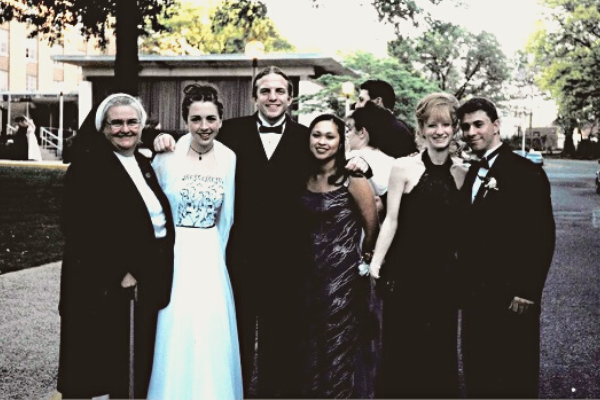
Ellen and some of her classmates and friends posed with Professor Emerita of English Anne Denise Brennan, S.C.
“I thought a career working on animal viruses that could infect humans was both relevant and exciting,” Ellen recalled. “I decided against applying for PhD programs because I wasn’t prepared at that point to specialize in a very specific topic that I would work on for six or seven years.”
That realization led Ellen down what some might say was a destined path to veterinary school.
“I had been working at vet clinics for a few years after I graduated from the Mount. I knew that earning a DVM would be a viable path for me, and got excited when I learned that there were lots of veterinarians working in both infectious disease and public health!”
After four grueling years of studying, clinical experiences, and (of course) petting lots of dogs, Ellen completed vet school at the Cornell University College of Veterinary Medicine in 2007.
But, even as she finally earned her DVM, there was one thing she truly missed: research.
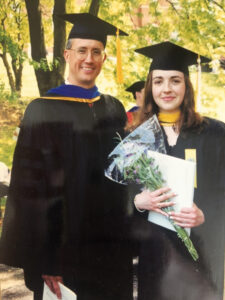
Ellen enjoyed the research she completed in her undergraduate courses in biology as a student at the Mount and alongside Professor of Biology and estuarine ecologist Michael Judge at Manhattan College—a mentor she was introduced to through the Mount-Manhattan joint program in biology during the 1990s.
Fun fact: in 1996, during her freshman year at the Mount, Ellen won the Covella Award for excellence in research writing. Her paper had a focus on the influence of religion on the science of astronomy for a class she took with Professor Emerita of English Patricia Noone, S.C.
“I had a devotion to research, but to enter the fields of public health or epidemiology would really have required me to complete more schooling,” said Ellen. “And after four long years of vet school, I needed a break!”
Yet, she knew she wanted to further pursue infectious disease research at the epidemiological and policy level.
So, she got to work.
“In my first role out of vet school, I worked on a science policy fellowship through the American Veterinary Medical Association,” indicated Ellen. “As a congressional fellow for the American Association for the Advancement of Science, I worked for a year with the House Committee on Homeland Security.”
The purpose of the fellowship was to infuse science and medical expertise into the federal policy-making process. Ellen loved her visits to Washington, DC and (as we already learned) was very interested in developing policy. So, she packed up her bags and moved to the capital.
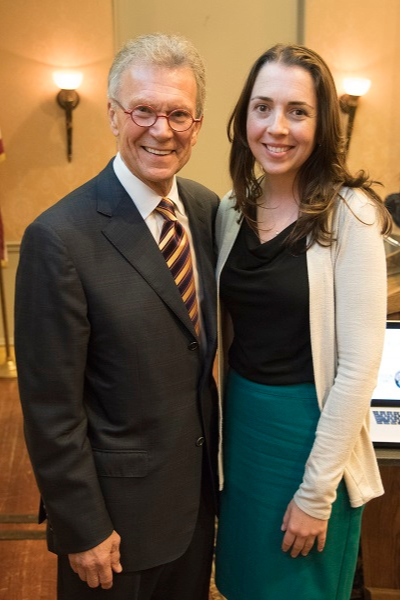
Ellen’s had the opportunity to meet and work with many different political figures, including former Senate Majority Leader Thomas Daschle.
During that time, Ellen worked on homeland security policy related to biological threats, including zoonotic diseases. She assessed legislative gaps, drafted legislation and briefing memos, briefed Members of Congress in-person, spoke on conference panels, and conducted site visits.
“It might have been non-traditional, but it was an incredible opportunity to integrate what I learned in vet school in a different way. After I completed the fellowship, I was hired full-time as Professional Staff—a role I held for over four years, culminating as Senior Professional Staff.”
Fast-forward to today, Ellen’s current endeavor at Parapet has her doing the work she truly loves.
“I think it’s unusual for scientists to be so involved in making and analyzing policy, and conversely for policy experts to also work in the sciences. I like doing both—even if it makes me more of a generalist in two fields than a specialist in one.”
She is also consulting with her colleagues at Pathway Policy Group, where Ellen serves as Vice President. The team at Pathway works alongside several infectious disease and philanthropy groups—all with a nexus to science—to ethically and responsibly guide clients through the federal policy making process.
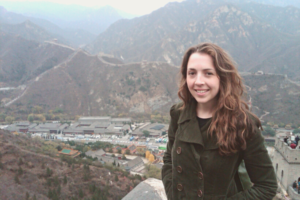 |
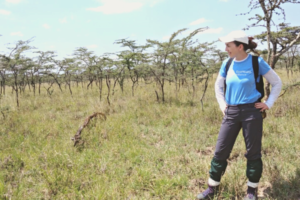 |
From a trip to China in 2011 to field work in Kenya in 2019, Ellen has traveled the world to present on her research and policy work.
Ellen admits that she’s had the privilege of participating in some once-in-a-lifetime opportunities because of her jobs and her expertise. She’s staffed Members of Congress as they delivered remarks on the floor of the House of Representatives—some of which she wrote herself! She’s traveled for work all over the world—including to Israel, Poland, China, and West Africa—where she’s presented research and worked alongside international governments. And while in West Africa, she visited a sanctuary called the Liberia Chimpanzee Rescue and Protection, which is run by Ellen’s friends and colleagues Jim and Jenny Desmond.
“I spent the day with their infant and juvenile chimpanzees, holding and playing with them. I was reminded that, 20 years prior, I wrote my senior thesis at the Mount on chimpanzee behavior! It was a true full-circle moment for me.”
Reflecting on how she got to where she is today, launching a career she truly loves would have been impossible without Ellen’s Mount experience. She firmly believes that Mount Saint Vincent not only helped her prepare for a job, but it framed her outlook.
“I was provided with a sound education in the liberal arts—which included both the sciences and humanities—that helped me prepare for graduate school. But, the Mount also approaches education in a way that curates the development of the whole person.”
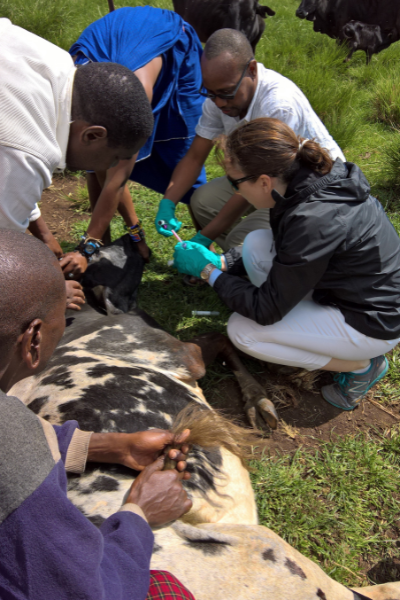
Ellen also found that she developed a strong sense of participating in one’s community while at the University, and was inspired by the Sisters of Charity who devoted their lives to improving life for others.
Because of the Mount’s intimate class sizes, she was able to forge relationships with several of her faculty members—both within the Division of Natural Sciences and beyond—and she still keeps in touch with many of them today.
“A number of my former teachers wrote letters of recommendation for me for graduate school—and that was no small thing, since I had been away from the Mount for several years before I applied to vet school. If I had gone to a larger school for my undergraduate degree, I doubt my professors would have remembered me well enough to write a personalized letter. I firmly believe that the small classes are one of the greatest assets of studying at the Mount.”
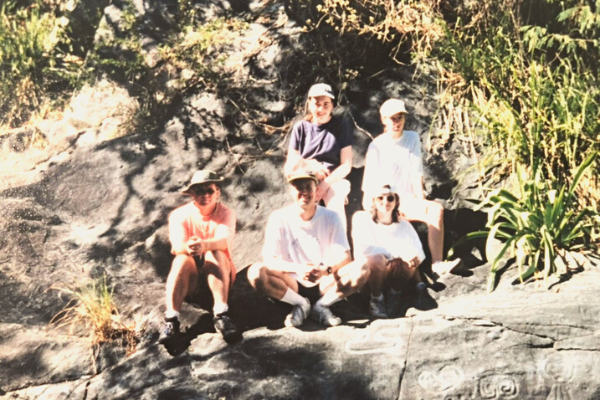
Ellen was able to travel to the Virgin Islands with Dr. Judge and some of her classmates in 1997 to conduct research in marine biology—a rare opportunity for undergraduate students!
Something else she gained from her time at the Right Place on the River? A knack for photography! Ellen took a year of introductory photography during her senior year with Professor Richard Barnet, who retired just a few years back. The work she did in the field taking photographs and in the dark room developing them form some of her favorite memories of class time at the University. She continues to take photographs as a hobby today.
She was also an active member of the CMSV (now UMSV!) Players, the theatre and drama club on campus. She was regularly featured on-stage with her classmates and professors—and is pictured as a performer in the Mount’s Renaissance Festival held in the late ’90s.
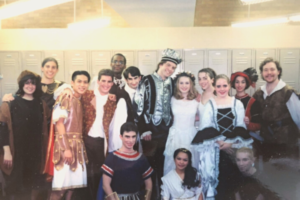 |
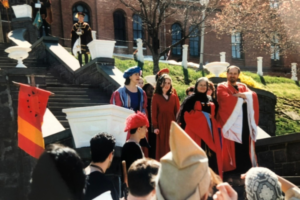 |
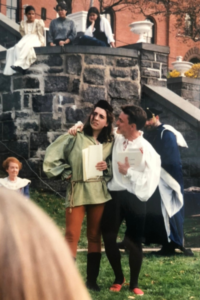
Remaining connected to the Mount today, and giving back to the current generation of students, Ellen currently serves as a Mount Mentor for an undergraduate student here at the University—Elsean Santos ’24.
“I recently had the opportunity to visit campus and join the Division of Natural Sciences for Elsean’s senior colloquium presentation,” Ellen shared. “I’m so proud of the work Elsean has done, and it’s an honor to be his mentor. He even applied for admission to the UMSV Physician Assistant Program—fingers crossed he’s accepted!”
Looking back on her career, even though Ellen might not be a practicing clinical veterinarian, don’t think that DVM is going to waste…
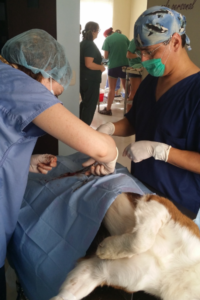
“I have always kept up my veterinary license and have worked over the years at small animal relief events and for animal shelters and low-income efforts,” Ellen mentioned.
In 2017, she traveled to the Pueblo of Laguna Native American Reservation in New Mexico to volunteer at a clinic. She’s pictured at the left performing a spay surgery on a dog at a clinic in Mexico in 2014.
“I continue to do this work not only because it allows me to use my degree, but because I’m able to help people and animals in need.”
Creating her own schedule as founder of her own company, Ellen has the flexibility to work whenever and however she wants. That’s given her the opportunity to find new ways to volunteer in her community.
Lately, she’s spent time volunteering with the District of Columbia Medical Reserve Corps, a federally funded program of volunteers trained in medical emergency preparedness, response, and recovery. Ellen also continues to teach a one credit remote class at Cornell, which she’s been doing for about seven years.
And don’t think we’ve forgotten to mention that Ellen is a published author!
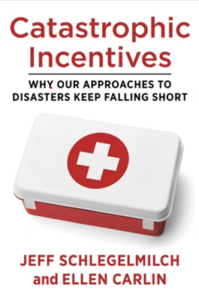
Written together with her colleague, Jeff Schlegelmilch, Ellen published Catastrophic Incentives: Why Our Approaches to Disasters Keep Falling Short with Columbia University Press in 2023. In the book, Ellen and Jeff examine over twenty years of disasters from 9/11 to COVID-19 and show how flawed incentive structures make the world more vulnerable when catastrophe strikes.
It’s evident that Ellen’s worn many hats over the past few years, but we know she’ll stop at nothing to continue to promote public health for both humans and our furry counterparts—and we look forward to hearing more about all she accomplishes in the future!
Are you Mount Made? Do you know other alums carrying out the mission of the University? Let us know—we’d love to share how the Mount helped launch your career. Contact us to be featured!
About the University of Mount Saint Vincent
Founded in 1847 by the Sisters of Charity, the University of Mount Saint Vincent offers a nationally recognized liberal arts education and a select array of professional fields of study on a landmark campus overlooking the Hudson River. Committed to the education of the whole person, and enriched by the unparalleled cultural, educational, and career opportunities of New York City, the University equips students with the knowledge, skills, and experiences necessary for lives of professional accomplishment, service, and leadership in the 21st century.
